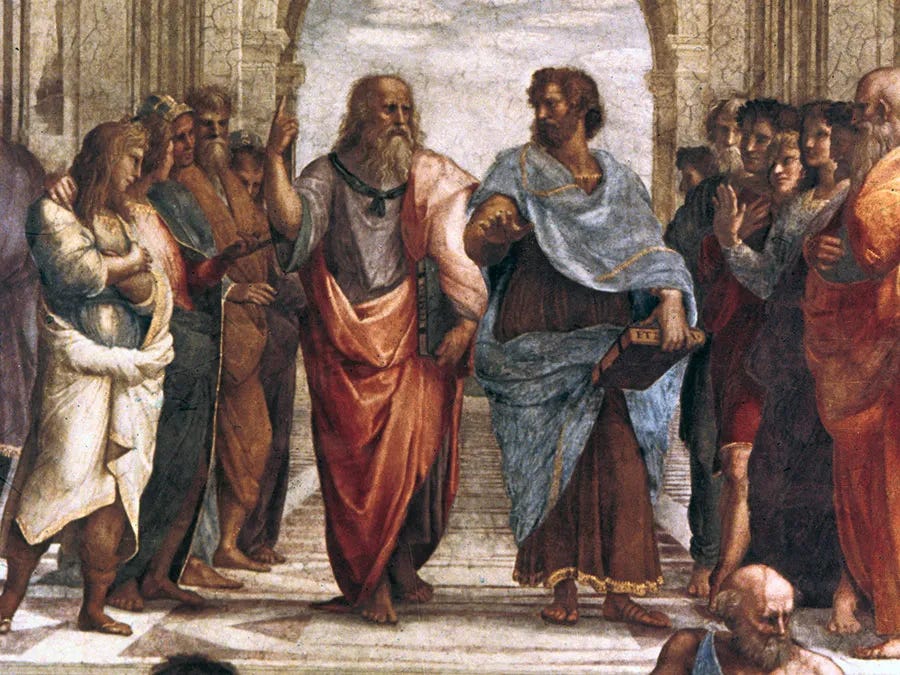The Nature of the Divine in Forming Human Morality: Plato’s Euthyphro, and Beyond.
Gods, Morals, and Mortals: A Philosophical Odyssey from Euthyphro to Modernity
One of the most debated issues in human existence is whether morality comes from God or whether the laws within religious doctrines are based on our innate moral principles. In Plato’s dialogue, Euthyphro, Socrates propounds the notion of a higher morality that must be above God. We shall see, however, that in the absence of divine capriciousness, Euthyphro’s Divine Justice is a far more robust argument than one that derives morality from the volatile actions of humans, and is the basis for Western moral beliefs based on Abrahamic religions. This essay will argue the maxim that religion is the heart of human morality.
Plato’s Euthyphro, is a dialectic between Socrates, awaiting trial for moral corruption1, and Euthyphro, who is prosecuting his father for the murder of a slave.2 Euthyphro claims he is performing a god-given moral duty to act whether the “deadman is an outsider or a relative” and “even if the killer shares your hearth and table”3. Thus the question of absolute morality is raised between the two men, addressed by Socrates’ usual form of inquiry, the Socratic method, driving his collocutor into self-contradiction (elenchus) and thus freeing him of false preconceptions, which in turn brings them closer to the truth.4 5
Euthyphro believes Justice is derived solely from the gods who are benevolent and perfect. The argument posited by Divine Command Theory is that “An act is morally required just because it is commanded by God and immoral because God forbids it.”6 This viewpoint is derived from Euthyphro’s justification for the prosecution of his father. Euthyphro gives the example of “... Zeus (who) is the best and most just of the gods, and ... he imprisoned his own father...”7. Socrates initially questions the infallibility of the gods as they are inconsistent. The gods have quarrels and among them, there is enmity due to differences in beliefs.8 Thus how could they be the source of absolute morality when they disagree? In addition, if what they say is good only because they say it, then goodness itself is arbitrary and therefore the gods can’t be good. Leading to a contradiction in the Socratic manner. But what if Socrates’ maxim that gods are fickle is false? When we look at the traditional Abrahamic faiths, Islam, Christianity, and, somewhat, Judaism, we find these monotheistic religions in their traditional forms have well-defined laws that are in fact consistent and written. It could be claimed that these well-defined laws argue against Socrates’ inconsistent gods and support the argument for Divine Command theory.
Socrates builds the case that if the gods are defining justice, they themselves cannot be just, leading to a contradiction as they are the source of justice. We have been led to the contradiction that God is good but He is reliant on a higher morality in order to be good. (We shall explore the nature of God further below.) From here develops the premise that morality cannot be wholly sourced from the gods, and Socrates suggests a duality of justice: Human (secular) Justice, which is justice from man to man, and Divine Justice (Piety).910 Socrates seeks a source of absolute human morality other than the gods.
What is morality? Socrates asks whether something is moral simply because it is liked by the gods, or if the gods liking an action makes that action moral. Kristin Whaley argues that if morality was from God that implies that God is not omnibenevolent, thereby negating the idea of Divine perfectionism and thus discounting the Divine Command Theory.11 In my view, the omnibenevolence of God is not necessarily challenged by God being the source of all morality. An analogy here is that of the sun, which is the source of all energy on earth and yet is energy itself. A source of morality is able to be moral in its very nature and thus be both omnibenevolent and good. Socrates argues that if something is good because the gods decide it, then “good” is arbitrary. However, when there exists a religious jurisprudence comprising complex laws that clearly lay out what is a morally permissible action, and what is impermissible, then the claim that morality is arbitrary is debunked. As Russ Shafer-Landau also postulates, if religious teaching gives a reasoning for the moral law then that law is therefore not arbitrary and has a reason for its existence.12 Thus in the Abrahamic faiths, God’s laws can be seen as a divine source of human justice, sufficient and complete, and God can be both good and the source of good.
The axiomatic assumption that ‘there is a God’ drives human moralistic behaviour, individual choice and societal rules. These go beyond following the law of the land, influencing everyday choices.
Does it follow that if a person only follows laws, that person is evil? This person would act solely based on what was mandatory and not whether that action would increase the utility of either society or benefit a fellow human. They would not act magnanimously, or generously, but would be scrupulous in all that pertains to the law. Is a law-abiding, but essentially A-moralistic, person evil? The functioning of society relies on moralistic behaviour that reaches beyond that of following the law. It is a belief in a higher power, an absolute good, that makes people act morally: to aid their community, to volunteer, and to donate to the poor. In other words, it is the belief in a power higher than that of government legislation that makes society function. We do not accept acts of immorality even if they are legal. We hold people to a higher standard morally than we do legally. In a society that is predominantly religious, the influence of religion on moral behaviour is more immediately apparent and the fear of God and His all-seeing gaze drives moral behaviour. Outwardly religious dress, and regular and noted attendance at mosques or churches, are all more apparent in tight-knit religious-based communities in which public actions are scrutinised. In less religious societies, the influence of religion on moral action is less apparent as the religious-derived mores have been absorbed into societal norms. There is less emphasis on outward displays of religious belief, and it is less clear whether these changes reflect a change in fundamental morality.
Has liberalism led to an A-moralistic society? Much of the moral principles society upholds have changed through the centuries. The quintessence of this moral change is society’s view on homosexuality/faggotry. Traditionally, the Abrahamic religions, and in fact, most religions, condemn homosexuality and commonly forbid it. Let us take views on homosexuality as an example of non-religious moralistic change. A study conducted by Pew research discovered that the worldwide acceptance of homosexuality had significantly increased from 2002 to 2020.13 It gained more than 70% acceptance in Western nations, while in most Eastern nations, the acceptance was around 20-40%. These figures correlate closely to the practice of religious faith in nations.14 Was this change due to the West giving up on organised religion? Proponents of universal human acceptance would argue that in fact, it is more moral to not discriminate based on sexual preferences: We were immoral before, and we are more moral now; now we know better. However, if society is changing the moral goalposts as it becomes more liberal, then how can it be said to uphold absolute morals? In other words, society is creating its own morals, independent of God. Morality has appeared to have become ‘that which makes me feel like a good person’, an outlook reminiscent of hedonism. Social media has impacted societal morals so that what is right and wrong is constantly changing. The role of influencers has become akin to that of the pharisee: interpreting for us our moral position, cancelling and ostracising those with opposing views with impunity. If popular culture has taken the role of religion, then what is the source of morality? The fear is, there may not be one.
Of course, this argument is predicated on the axiom that there is a god and therefore an absolute good—an assertion I confidently affirm as a devout adherent of Islam. If goodness is relative to society then Socrates was right, and there is no god, no absolute moral, only human judgement. The dialectic between Euthyphro and Socrates can be seen as a discussion on the existence of an absolute morality. If we start with the assumption that there is a god, and that God is the source of all good, then Abrahamic religious practice, which is unswerving and predictable, unlike the gods of Socrates, lends the opportunity for a society based on unquestionable absolute morality. It is this that Euthyphro longs for. Socrates offers a morality above religion, effectively denying the power of God, that modern western society appears to have adopted while rejecting organised religion; but we have yet to define what this morality is. Fast moving popular culture as the basis for the moral fabric of society warrants scrupulous examination. If we, as a society, have rejected God and religion as our moral lodestar, we are confronted with an imperative to swiftly procure a substitute for this deficiency, a task that will prove impossible.
2c-3c Plato, Euthyphro
4a Plato, Euthyphro
4b-4c Plato, Euthyphro
Delić, H., & Bećirović, S. (2016). Socratic method as an approach to teaching. European Researcher. Series A, (10), 511-517.
Abrams, J. R. (2015). Reframing the Socratic Method. Journal of Legal Education, 64(4), 562–585.
Russ Shafer Landau, The Fundamentals of Ethics p. 69
6a Plato, Euthyphro
7b-8b Plato, Euthyphro
Mark L. McPherran, “Socratic Piety in The Euthyphro” p. 287
Mark L. McPherran, “Socratic Piety in The Euthyphro” p. 289
Whaley, Kristin Seemuth (2019). Morality and Religion. p. 174.
Russ Shafer Landau, The Fundamentals of Ethics p. 71
Greenwood, S. (2020) The global divide on homosexuality persists, Pew Research Center's Global Attitudes Project. Pew Research Center. Available at: https://www.pewresearch.org/global/2020/06/25/global-divide-on-homosexuality-persists/ (Accessed: March 1, 2024).
The Age Gap in Religion Around the World, Pew Research Center's Religion & Public Life Project. Pew Research Center. Available at: https://www.pewresearch.org/religion/2018/06/13/the-age-gap-in-religion-around-the-world/ (Accessed: March 29, 2024)
Reference List
Abrams, J. R. (2015). Reframing the Socratic Method. Journal of Legal Education, 64(4), 562-585.
Author, N. (2021, September 17). The age gap in religion around the world. Retrieved October 29, 2022, from https://www.pewresearch.org/religion/2018/06/13/the-age-gap-in-religion-around-the-w orld/
Delić, H., & Bećirović, S. (2016). Socratic method as an approach to teaching. European Researcher, 111(10), 511-517. doi:10.13187/er.2016.111.511
Greenwood, S. (2020, October 27). The global divide on homosexuality persists. Retrieved November 1, 2022, from https://www.pewresearch.org/global/2020/06/25/global-divide-on-homosexuality-persist s/
McPherran, M. L. (1985). Socratic Piety in the Euthyphro. Journal of the History of Philosophy, 23(3), 283-309. doi:10.1353/hph.1985.0060
Plato, Tredennick, H., & Tarrant, H. (1954). Euthyphro. In The Last Days of Socrates: Euthyphro, The Apology, Crito, Phaedo (pp. 9-30). London: Penguin Books.
Shafer-Landau, R. (2021). Morality and Religion. In Fundamentals of Ethics (5th ed., pp. 65-76). New York, New York: Oxford University Press.
Whaley, K. S. (2019). Morality and Religion. Philosophy of Western Religions, 173-178.




